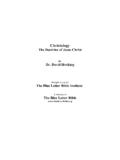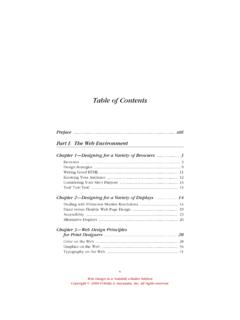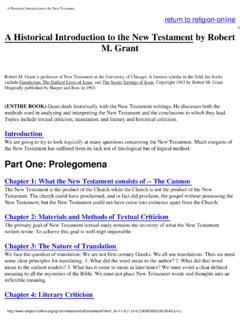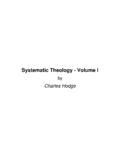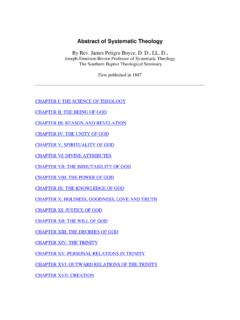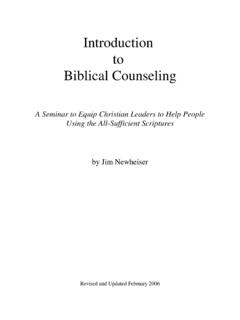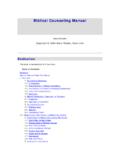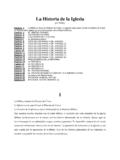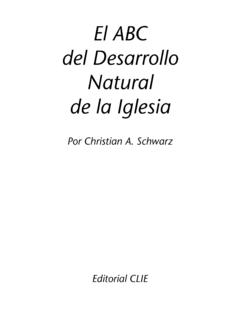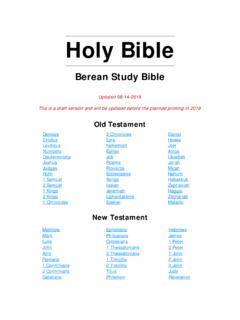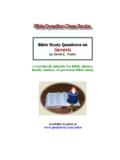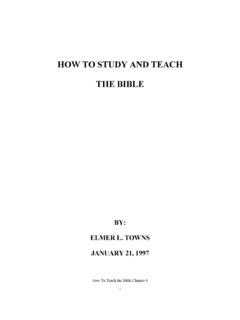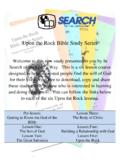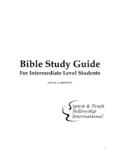Transcription of Bible Study Methods - Online Christian Library
1 !!" # $ $% $ All Scripture is inspired by God and profitable for teaching, for reproof, for correction, for training in righteousness; (2 Timothy 3:16) The word inspiration in 2 Timothy 3:16 is in the original Greek (theopneustos), which literally means God-breathed. For scripture to be breathed by God suggests that it originated from God s mouth or that it is the Word of God. Indeed, the term word of God is used synonymously with the Scriptures throughout the Bible ( John 10:35). The Mechanics of Inspiration There are numerous theories of how inspiration took place, including the following1: Natural inspiration - Human authors were inspired to write by God in the same way that a poet might be inspired to write poetry by natural events or conditions.
2 Spiritual illumination Human authors themselves are inspired by God in the same way God inspires any Christian today through the ministry of the Holy Spirit. Conceptual inspiration God inspired human authors with the general concepts of the passage, but left the words and details to the author. Verbal inspiration God inspired human authors with each word, superintending even the details. Divine dictation Human authors just took dictation from God as he spoke. The best description of the process is found in 2 Peter 1:21, as he describes the process of prophecy being passed to human authors: ..for no prophecy was ever made by an act of human will, but men moved by the Holy Spirit spoke from God. (2 Peter 1:21) Inspiration means, then, that the decision to write it came from God, but human authors were used to speak as from God as the Holy Spirit carried them along.
3 This eliminates divine dictation, as it is the men who speak. Furthermore, this eliminates natural inspiration, as it has a divine origin. Spiritual illumination would mean the scriptures had no more authority than any Sunday morning sermon, which would contradict the authority attributed to Scriptures by Jesus and Paul. That leaves us with conceptual and verbal inspiration. Both suggest that human authors were involved in the writing, and that the individual personalities and styles of the authors come through in the process. However, God motivated the human author to write, and he oversaw over 1 Paul Enns. The Moody Handbook of Theology, (Chicago: Moody Press, 1989), 160-162. Page 2 Spring 2005 Bible Study Methods the process to ensure the end result communicated His message.
4 The question is how detailed was this oversight? Did he oversee the general content, or did he oversee each word? Jesus gives us a clear insight into the level of detail in Matthew 5:18: For truly I say to you, until heaven and earth pass away, not the smallest letter or stroke shall pass from the Law until all is accomplished. (Matthew 5:18) It seems Jesus was concerned about each word and stroke of the pen, suggesting that the oversight of God was detailed down to the finest detail. Therefore, verbal inspiration seems to be the best definition of what Paul means by the term in 2 Timothy 3:16. The Ramifications of Inspiration So if God superintended over the writing of each word, what does that mean about the veracity of the scriptures? If we believe God is a truthful God, his writings would also be truthful.
5 This is the feeling of King David as he writes Psalm 19. David, in describing the Scriptures, uses adjectives such as perfect and sure (v. 7), right and pure (v. 8), clean and true (v. 9). 7 The law of the LORD is perfect, restoring the soul; The testimony of the LORD is sure, making wise the simple. 8 The precepts of the LORD are right, rejoicing the heart; The commandment of the LORD is pure, enlightening the eyes. 9 The fear of the LORD is clean, enduring forever; The judgments of the LORD are true; they are righteous altogether. 10 They are more desirable than gold, yes, than much fine gold; Sweeter also than honey and the drippings of the honeycomb. 11 Moreover, by them Your servant is warned; In keeping them there is great reward. 12 Who can discern his errors? Acquit me of hidden faults.
6 13 Also keep back Your servant from presumptuous sins; Let them not rule over me; Then I will be blameless, And I shall be acquitted of great transgression. 14 Let the words of my mouth and the meditation of my heart Be acceptable in Your sight, O LORD, my rock and my Redeemer. Why should we Study the Bible ? The Bible gives us wisdom and enlightenment, refreshment and joy. It warns us, corrects us, and keeps us from sin. According to 2 Timothy 3:16, the Scriptures are the primary tool by which a Christian is to hear and understand God s will and serves as the primary authority in the life of a Christian . If we don t Study the Bible , we will be ignorant of God s will and therefore we are rejecting the authority of God over our life! & $ The Bible is indeed the very word of God.
7 However, God chose to reveal His Word through human authors who wrote to specific audiences in a specific place and time. As such, the Scriptures are not written as a series of timeless principles and commandments which can be read and understood simply. If God has chosen to reveal His Word to us this way, it might have made our Bible Study easier. However, God because God chose to communicate His Word through his interactions and relationships with humans, it gives us comfort and an understanding that God still desires to be Bible Study Methods Spring 2005 Page 3 involved personally with us and is not merely impersonally dropping commandments on us from on This is what also makes Bible Study necessary. The Bible is written in a number of different literary genres, to a number of different cultures, in 3 different languages, through dozens of different human authors to people throughout a 1,500 year span of time.
8 The primary reason why we need to Study the Bible , rather than just read it, is because we must read and hear God s Word as the original recipients would have heard and read the scripture. Bible Study requires that we have a solid understanding of biblical cultures, languages, history, and geography. Bible Study is essential so we can hear the message in the context originally given. One has to hear the Word they heard; you must try to understand what was said to them back then and there3. In contrast, the purpose of Bible Study is not to enhance or augment the scripture. The scripture already is God s Word. There is nothing we can do to the text to make it anymore than it already is. The purpose of Bible Study is not to make the Bible relevant.
9 The scriptures already are relevant. We can t make them more or less relevant. The purpose of Bible Study is not to make the scriptures come alive. The scriptures already are alive. The purpose of Bible Study is not to defend the Bible . The Bible is its own apologetic, because it convicts and penetrates the heart. For the word of God is living and active and sharper than any two-edged sword, and piercing as far as the division of soul and spirit, of both joints and marrow, and able to judge the thoughts and intentions of the heart. (Hebrews 4:12) If the Bible does not seem relevant or alive to us, it is not God s fault nor is it the Bible s fault. It is our fault for not understanding how to Study the Bible properly. The purpose of this term is to provide you with a simple, proven process to Study God s word so that you can see for yourself the relevance of the living word of God in your life.
10 ' ( God s inspiration applies only to the original texts, which were written in Hebrew, Aramaic and Greek, and not any subsequent translations. Ideally, we would all become experts in these ancient languages and be able to understand the nuances of the original vocabulary and grammar as we read from the original text. However, this is not a practical solution for most of us. Fortunately we have an abundance of tools in the English language that can make the nuances of the original language accessible to the modern English reader. In this class we will learn to use some of these tools, such as concordances, lexicons and interlinear bibles. The English language has also been blessed with a multitude of translations. There are more translations of the Bible into English than into any other language.)
